How Drew Pavlou’s University of Queensland protest enraged China and started a free speech battle
Student activist Drew Pavlou has always had a difficult relationship with authority. His anti-China stance has cost him dearly.
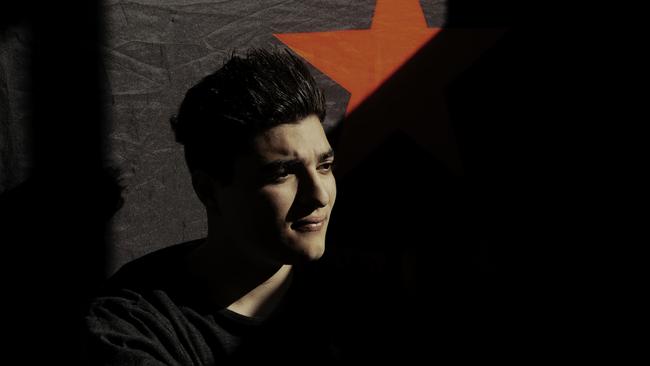
The thing you learn very quickly about Drew Pavlou is that he is a certified, card-carrying member of Generation Z. He and the fellow travellers of his epoch (born post-1996 or thereabouts) have iPhones and iPads grafted to their hands. They communicate via social media, and the more platforms the better. Nothing happens and nothing is real unless it is delivered in text form. Or in a video. Or via a meme (Oxford Dictionary: an image, video, piece of text, etc, typically humorous in nature, that is copied and spread rapidly by internet users, often with slight variations.) Negotiations with real human beings, in the actual physical world, therefore, can sometimes be disorienting.
So it is that on the day we’re supposed to meet at his family home in Coorparoo, Brisbane, Pavlou, 20, has misread a Facebook Messenger text about the where and when of our assignation. We were going to talk here and then head over to the University of Queensland, where he is studying philosophy and political science and where, last July, with a few sheets of cardboard, a borrowed megaphone and a few friends, he sparked an international incident between Australia and China that saw him pop up everywhere from The Washington Post to BBC World News to The Global Times, the Chinese Communist Party news outlet. In a flash he was able to send ripples across the planet and begin a debate about Chinese financial and political influence on Australian university campuses, and the very nature of freedom of speech – and yet he can’t quite manage the logistics of a local catch-up.
Pavlou: Would it be OK to push back 15, mate? Sorry there’s been a stuff up a family member took my car. Sure, I can shoot you over to UQ after our interview if it suits. Pavlou: Ohhh right, we are meeting in Coorparoo just remembered!
Am outside. Pavlou: Sorry mate, just a minute have to brush my teeth and what not. So sorry man I’m so disorganized.
He appears at the end of the driveway and offers a wave. He is shoeless, thick black hair gelled up, with the rosy cheeks and bearing of a boy still in high school. Over the next few hours he will often talk about once upon a time when he was “young”. And, always, the iPad is either in his hands or within reach on the couch or the coffee table. At any given moment it is receiving messages, likes, comments, threats, retweets, notes, memes and pings, the unending static that is the soundtrack of Gen Z communication.
He sits on a couch in the lounge room, one leg tucked under the other, as we talk. His dialogue is often one long, expansive stream of ideas competing against each other, racing to the finish line, underpinned by the energy of youth and the excitement of fresh learning and ideas.
Despite the verbiage, there is at the moment a single point of focus in the Pavlou household: Pavlou is waiting to hear whether he is to be expelled from the University of Queensland for alleged disciplinary offences triggered by his anti-Chinese government protest on July 24 last year (he was expelled on Friday until 2022) How did the mild-mannered eldest son of a conservative Greek greengrocer manage to attract the world’s attention for a campus protest, garner countless death threats against himself and his family, spark a closed University of Queensland disciplinary hearing, and threaten to bring what was building as a stellar academic career to its knees?
It’s a struggle that now reaches beyond this one unassuming student. “He is at a kind of critical point in the collision of two great tectonic plates,’’ says Clive Hamilton, a Sinologist and professor of public ethics at Charles Sturt University in Canberra. “The Western system coming up against that of the Chinese Communist Party, which is a global struggle. It’s a grand story of one man’s will versus these extraordinary forces.”
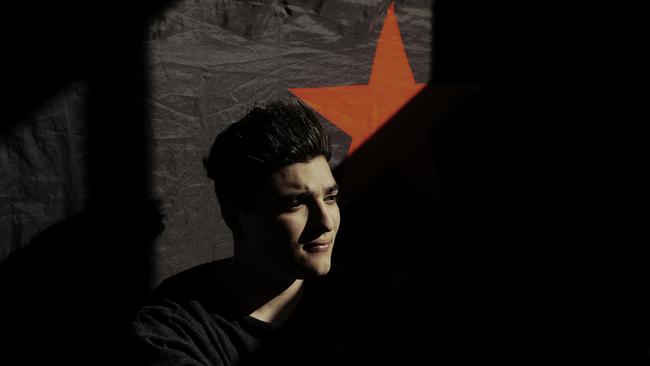
If there were a meme that might represent the Pavlou family, it would be the authoritative visage of the Ancient Greek general and politician Themistocles, who died in 459BC, but not before playing a major role in supporting early Athenian democracy, standing with the poor and antagonising the nobility. Drew’s paternal grandparents migrated in the 1960s and carried the surname Themistocles to Australia before changing it to Pavlou. A proud Greek Cypriot family used to hard work and enterprise, they soon made their way, starting fruit-and-veg shops, hairdressing salons and a restaurant on the Gold Coast, where Drew was born to father Nick and mother Vanessa in 1999. The family moved to Brisbane two years later.
Pavlou takes solace in the fact that there are some important historical figures down the family line, some of whom died fighting as members of EOKA, a guerrilla outfit dedicated to ending British rule in Cyprus. A great-grandfather on Vanessa’s side was imprisoned by the Nazis in World War II and survived concentration camps. “These are people who are tied up in the grand struggles of history, which is very cool,” he says.
He attended the Catholic college Villanova for his high school years and admits to being a bit of a troublemaker. “I always had a thing for, like, niggling those authoritarian teachers. I think I’ve always had that anti-authoritarian, ‘kick the hornet’s nest’ side to me. There were a few times where I really came close to suspension. The first week of Grade 12 I was suspended because I wore a mohawk to my first day of classes and they just sent me home… I guess I’ve like always had a difficult relationship with authority.”
Pavlou’s political awakening came in 2016 in the form of social democratic progressive US politician Bernie Sanders. This is how Pavlou describes that moment: “When I became very political, 2015, I was 16; Bernie Sanders’ campaign in America. We had independent study periods at Villanova, one period a day where they just let you study… me and a friend would just follow the news about Bernie… that was the wake-up… I liked his social conscience, his commitment to justice, his overwhelming focus on human dignity and uplifting the lives of the poor and stuff like that… and his concern for, like, making a better world...”
It’s endearing to be present when a young mind, still forming itself, still heady with the excitement of a university education, still drinking in ideas and devouring books and trying to connect the dots on where you fit into the world, has all its synapses firing simultaneously, straining to process all that it is absorbing, all it wants to take in at this moment, and that is all the knowledge of the world. You can almost hear his brain cells trying to organise themselves and sometimes, through the blur of all this activity, you can glimpse on Pavlou’s face the boy who only recently graduated from high school.
He was enjoying university life, writing award-winning poems, getting good grades and academic awards, meeting friends as part of numerous university clubs and societies out at UQ’s beautiful St Lucia campus.
Then came July 24, 2019.
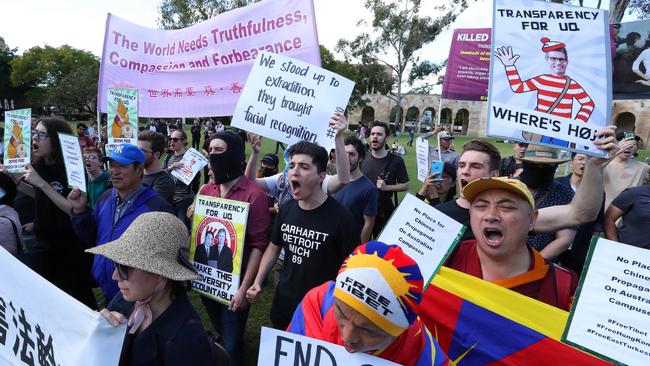
It percolated, of course, online. In early June last year it was the 30th anniversary of the Tiananmen Square massacre, where a peaceful protest against the Communist Party was violently shut down by China’s military. The estimated death toll varies from several hundred to several thousand. Less than a week after that anniversary, hundreds of thousands took to the streets in Hong Kong, protesting against the introduction of legislation that would allow those charged with an offence to be extradited to mainland China. There were fears that Hong Kong’s autonomy was under threat.
Drew Pavlou, in Brisbane, was keeping a close eye on all of this. “It built up over time,” he says. “Hong Kong first started in May-June, and in those first couple of weeks it was on my radar because I’m an obsessive news reader… Probably around the time of the Tiananmen Square anniversary, that’s when it all started, ‘nothing happened June 3-4 1989’, the meme, all these [internet] posts saying nothing happened on that day. You started seeing some people at UQ groups, online, seriously trying to deny that Tiananmen happened, or defending it, and I remember being so outraged and annoyed and frustrated… that was the moment where I was, I’m annoyed. I felt like posting memes and shit-posts mocking people… they started attacking me and it just spiralled.
“I thought, you know what, it’s time to do something… it all came together and that side of me, like I was a kid, I wanted to kick the hornet’s nest… I’ve got to do something, it felt overwhelming… I’ve got to kick the hornet’s nest.”
Pavlou had never organised a political rally or protest before. He just knew he had to strike when and where his message could get maximum attention. He decided on University of Queensland’s Market Day – probably the biggest day on campus, with more than 190 stalls signing up members for clubs, societies and activities. There are about 55,000 students at UQ, with around 20,000 visiting campus daily. Pavlou knew thousands would be in the Great Court and surrounding squares, cafes, restaurants and facilities on that day.
The problems, however, began the night before. He had posted on Facebook details of his protest for midday, July 24. The detractors started moving in before a physical banner had been lifted, without a single word spoken. Part of the event’s wide-ranging platform was support for the ethnic minority Uyghur Muslims from the north-western Chinese province of Xinjiang, a million or more of whom over the past decade have been placed by Chinese authorities in “re-education” camps. “Somehow, I guess, Chinese students got wind of the event and there was a big petition to stop the ‘pro-Uyghur terrorist event’, and things like that,” says Pavlou. “They said we had to be shut down. Some of the more vicious ones said, ‘Your mother is dead’, ‘You will die’, and stuff like that. These guys were sending me death threats, all on Facebook, a lot of it in Mandarin. ‘Don’t come tomorrow’, they said, ‘you’re gonna die’. I was talking to my mates… I was showing them what was being posted. I’m not going to give in to that sort of thuggery. ‘You should stand up for yourself’, they said.”
He found and posted an insult: F..k your ancestors for 18 generations. “These people were sending death threats. I don’t take bullshit easily. I was responding to death threats. I had to stand up for myself. I’m not Mother Teresa, you know… but they were encouraging Chinese students to come and stop the terrorist event, and they’d play the Chinese national anthem. Then when I did the ‘f..k your ancestors’ thing, the death threats got worse. ‘If you come tomorrow, we’ll kill you.’
“In my view, I probably did go a bit too far. I’m not a violent person. I’ve never been in a fight. But these people were threatening me, saying I couldn’t hold a rally in Brisbane, Australia, at my university about these issues. Or we’ll kill you, we’ll harm you.”
The big day arrived. Pavlou slept in. He recalls: “It wasn’t very well organised… I kind of slept in too late… I woke up at 10 o’clock, had to run down to the newsagent down the road and pick up these big posters I can use, then I drove in and got to the UQ library and started frantically making up the posters, and got another mate to print off the flyers, and that made us about 30 or 40 minutes late.
“There were all these people waiting for me. Oh shit, I don’t have a loudspeaker, found one in the union complex, I took it and… then we had about 15 people. I was very nervous… it was awkward. There was the risk we’d sit there for five minutes and then we’d just give it up. I thought we’d do it for an hour. I just wanted to do this rally, and if it ended after five minutes I’d go home with my tail between my legs and do my homework. I had no idea that it was going to be this huge standoff for six hours involving the media and police and stuff like that.”
Pandemonium followed. Pavlou and his small team of protesters sat down together to air their grievances, unaware that the crowd surrounding them had grown from 100 to 300 to upwards of 500 people. The protesters were declaring they didn’t want UQ to “do deals” with the Chinese government. They bemoaned the plight of the Hong Kong protesters. Then they chanted that Chinese President Xi Jinping “had to go”.
Pavlou says he was then attacked. “I look up and there’s this huge guy, six foot, 150kg, sunglasses, a backpack, and he grabs the loudspeaker from me and throws it to the ground with as much force as possible,” he says. “Then he stood back. He had attacked me, so I stood up, not a pushover, I was not going to just take that sort of stuff, so I pushed them back. Then another guy comes in from a different angle. They were co-ordinated and came in on different angles.
“They’ve all got sunglasses on. And all have backpacks. They’ve all taken steps to conceal their identity and one guy’s got an earpiece he’s speaking into. As soon as they grabbed the megaphone they started playing the national anthem. Chinese. A guy in a white shirt got me hard in the side, and I got back up… never been in a fight in my life, I didn’t want to show I was a pushover, got back up… the first guy got me right in the mouth, punched, I was thrown to the ground,” he says. That’s when security stepped in.
“It’s insane that this happened on an Australian campus. One minute I’m this ordinary dude and the next minute I’m at the crossroads of this huge political struggle, with people sending me death threats, and me being condemned as an anti-Chinese rioter by state media… I’m just this guy from Brisbane, 20 years old, never been an activist, never been in the public eye before, it was just insane. Yeah, we were provocative, but that’s the whole point of activism. What activists have ever done anything without rocking the boat?”
Footage of the event shows a man, possibly in his 30s, wearing dark sunglasses and what appears to be a wireless earpiece. Professor Hamilton says it was clear the pro-China activists who instigated the violence that day were not students at the university. “They were brawny and clearly trained in self-defence,” Hamilton says. Trained heavies; possibly MSS (Ministry of State Security) agents, he suggests.
Pavlou is flicking through his iPad, pulling up video and photos of that day taken by numerous onlookers and participants and sent to him. He has pored over the material countless times. He remembers how he was confused and shaken when he returned to the family home that night. When he woke the next morning his Instagram account was choked with hate messages. “I started getting messages saying, ‘We’ll find your address, we’ll torture your family in front of you, we’ll kill and rape your mother, we’ll kill you’. My social media was completely inundated with it. Basically, all my notifications were abusive.”
His family was terrified. “My family were like, ‘You have to move out’,” Drew remembers. “‘You’re going to endanger your brother, you’re going to endanger your little sister, what if something happens to them?’ [Brother Billy, 18, is a first-year at UQ; Annabella, 16, is in high school.] “I didn’t know where I was going to sleep that night. My parents were just, like, ‘You can’t be here anymore’. I didn’t know what to do. I had, like, $500 in my bank account. In the end I just stayed here against my family’s wishes. They were saying, ‘We’ll put all of your stuff on the kerb’ but they didn’t really follow through. They’re Greek parents, they love their kids, right? There was probably a month there when my family didn’t talk to me.”
The day after the protest, China’s Global Times wrote: “China’s Consulate-General in Brisbane, Australia, on Thursday issued a statement praising Chinese students, including those from the Hong Kong Special Administrative Region, at the Australian University of Queensland (UQ) who staged a voluntary patriotic rally in response to two consecutive anti-China and secessionist protests held at the university campus... The statement said the consulate attaches great importance to the safety of overseas Chinese students and firmly opposes any words and deeds intended to split China.” It named Drew Pavlou as the primary agitator.
Pavlou, in turn, decided to take the People’s Republic of China’s consul general in Brisbane, Dr Xu Jie, to court for allegedly accusing him of anti-Chinese separatism – a capital offence in China – and inciting death threats against him. Pavlou says he wants a retraction and an apology. Dr Xu Jie is also an adjunct professor at the University of Queensland. His comments after the protest earned a rebuke from Australia’s foreign affairs minister Senator Marise Payne.
In November last year, UQ issued a statement about the university, its transparency, its commitment to freedom of speech, and brief details about its investigation into the July 24 protest. In the statement, it posed the question: Is UQ committed to freedom of speech? “The events of recent months show that UQ is absolutely committed to freedom of speech. It is a fundamental tenet of any democracy and goes to the heart of the pursuit of truth, and therefore knowledge,” it stated.
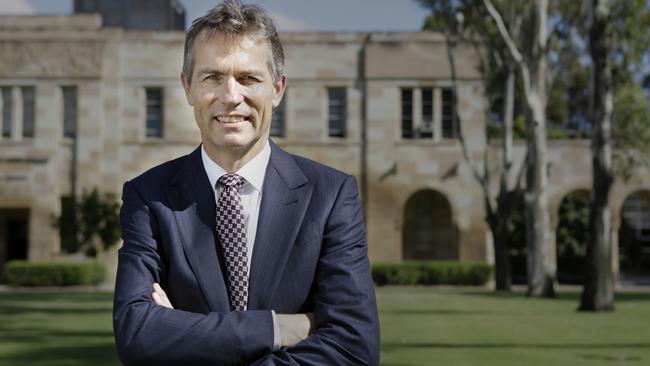
But Pavlou wasn’t done with the university. Not by a long shot. He wanted to meet with UQ Vice-Chancellor Peter Høj to voice his concerns about the university’s relationship with China, as he saw it. Then he saw a crack in the door: the University Senate. In October last year, he campaigned for election as a UQ Senator. He won. “The VC wasn’t going to meet with me, so the uni Senate elections were coming up and I thought, ‘That’s my in,” he says. “I can donate my $50,000 salary to human rights groups in China and piss off UQ that way, and also once I’m there, Peter Høj literally has to sit next to me at the table.”
And the university wasn’t done with Pavlou. On April 9, he received via email a 186-page document titled: Disciplinary Matters, detailing 11 allegations of misconduct against him. Under “Allegation Notice”, it stated: “It is alleged that you have, while enrolled as a student of the University of Queensland… contravened the University’s policies.” It was, in essence, an “expulsion” document.
Many of the allegations reached deep into the well of Pavlou’s social media history and in short claimed that he had variously harassed and bullied other students on Facebook, and in several instances had prejudiced the university’s reputation. Pavlou’s prank protest against what he perceived as the university’s slow response to the coronavirus epidemic in March this year, where he dressed in a hazmat suit and posted a note on the door of the Vice-Chancellor’s office, was at the heart of another allegation against him.
The document said under Allegation 7: “On or about 13 March 2020, you: (i) approached the Office of the Vice-Chancellor in the Brian Wilson Chancellery Building at the University of Queensland St Lucia campus... You were dressed in clothing consistent in appearance with an orange biosafety suit. You posted a sign on a glass door that accesses the Office of the Vice-Chancellor which read as follows: COVID-19 BIOHAZARD: CONDEMNED.” That stunt earned the following rebuke from UQ: “It is also alleged that by engaging in such conduct, you failed to treat the Vice-Chancellor, the Vice-Chancellor’s staff, and UQ Security with respect and courtesy in your online communications, and in a fair and respectful manner regardless of individual differences.”
Then there are the particulars of Allegation 3: “It is alleged that on or about 26 February 2020 at approximately 12:30pm, at the Secondhand Texts and Stationery shop located on the University of Queensland St Lucia campus, you purchased three (3) sheets of card. You picked up a saleable black marker from a shelf, lay the card on the ground in front of the shop’s counter and wrote messages on the card with the black marker, thereby blocking customers from being served. You then placed the black marker back on the shelf. Staff requested that you pay for the black marker but you exited the shop without doing so.”
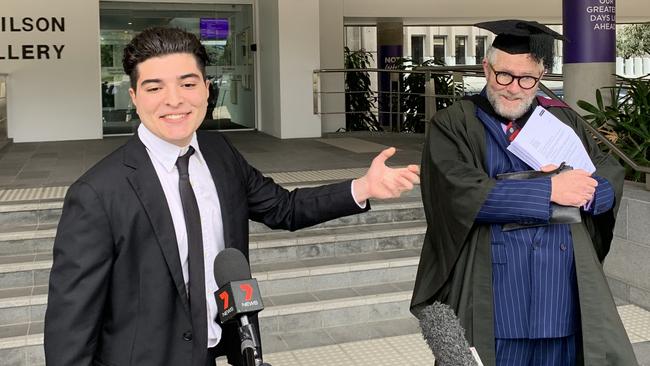
Pavlou is both amused and appalled at what has happened to him since that naive protest almost a year ago. “There are some people, those student politics people, saying I’m just doing this for attention, that everyone gets called up to the disciplinary board, he’s just exploiting this, he’s just going to get a slap over the wrist, he’s just a master spin doctor… but you get 186 pages, do you think this is a slap on the wrist?”
His friends say Drew Pavlou the political activist hasn’t changed since high school. Liam Blair, 22, who studies at the Queensland University of Technology and knows Pavlou through student politics, says: “Some people see him as too erratic, a time bomb, but others see a genuine person, he is being himself, there’s no bullshit there. Fearless sounds like a bit of a wank, but that’s what he is.”
Professor Hamilton says the Pavlou affair reveals many of the tactics the CCP has been using in Western countries to gain political influence. “It’s been coming for a while and it’s breaking out all over the world. In the Drew Pavlou case, it’s a complete mismatch of powers. What has Drew Pavlou done to deserve this? He’s really gotten under their skin. He has enraged these beasts. I find that extraordinary, the fact that he has not given up. It’s testament to the power of one determined individual who believes he’s doing the right thing. It’s a grand story of one man’s will versus these extraordinary forces. It’s opera. The University of Queensland has put itself in a very difficult position.”
UQ would not respond to specific questions but in a statement says its policies “are not driven by politics, and we completely reject the claims that this ongoing disciplinary matter is a free-speech issue; student disciplinary matters are initiated in response to complaints made to the university”.
Pavlou was represented at his disciplinary hearing by top-flight barrister and long-time defender of free speech Tony Morris QC. The confidential hearing was held on Wednesday, May 20. Morris’ 53-page response to the allegations was powerful to the point of devastating in its analysis and condemnation of UQ’s actions in the Pavlou affair. Morris wrote: “…in a context where UQ’s administration, over the past 10 years, has done everything in its power to traduce and destroy UQ’s former ‘reputation’ as ‘a place of light and learning’, Mr Pavlou has been the shining beacon which allows UQ students (if not UQ’s administration) to regain at least some measure of honour, respect, approbation and esteem in both the domestic and the international communities. In short, Mr Pavlou has not prejudiced UQ’s reputation; he has enhanced it by his unrelenting campaign to expose and protest UQ’s obnoxious relationship with a maleficent regime.”
A political flashpoint in the past year has been the presence of Confucius Institutes (Beijing- funded “education” centres, often accused of being propaganda units) on Australian university campuses, including UQ. In March last year the Federal Attorney General’s Department notified Confucius Institutes and other organisations across the country of a pending “transparency regime” to counter foreign interference and influence mainly throughout Australian universities. In his submission to the panel, Morris referred to the existence of UQ’s Confucius Institute, the Chinese government funding of four courses and the high number of Chinese students attending the university. (Chinese students account for about 20 per cent of the university’s total student intake.) He alleged that UQ had put its ties with China ahead of the rights of a student to protest.
Morris ended on a personal note. “If one may speak, momentarily, as a UQ alumnus and former President of the University of Queensland Law Society – one would like to think, moreover, as an alumnus whose career has not been entirely discreditable to his alma mater – I am now and will henceforth remain embarrassed for having any association with an institution capable of such vindictiveness and treachery.”
In the event, Pavlou and Morris walked out of the hearing shortly after it began, claiming it was a kangaroo court. Said Pavlou afterwards: “They can try and expel me, I welcome it, good luck to them, we’ll see them in the Supreme Court.” Yesterday, UQ announced its decision without offering any reasons: Pavlou has been suspended until 2022.
Back in Coorparoo, Pavlou is in his upstairs bedroom, which is almost monastic. “It’s the duality of man,” he says. “My room’s really neat but I’m so disorganised at the same time. I forgot you were coming to the house today and I was really late, even in my own house.” His mother Vanessa produces a plate of delicious pita bread with lemon. “I’m Greek,” she says. “You have to eat or you’ll offend me.” She hands over the dish. “I lead a very humble and quiet life.” She looks towards Drew. “I don’t know where he came from.”
Has her son contemplated the very real possibility that he may soon be barred from the University of Queensland, his degree in ruins? (While under pressure, he has managed to keep his grade point average well above six.) And is all this, in the end, about the price of free speech?
“Yes, of course. That’s why I’m committed to the battle,” he says. “If UQ had made this some sort of secret inquisition and worked out some deal with me behind the scenes, like, ‘Look, Drew, we’ll let you stay at UQ but you have to basically gag yourself…’ I’m not going to give them that, this is about free speech, it’s a line in the sand, you know, it’s a crossing-the-Rubicon moment, because if I’m punished for this, and I have all this public support behind me – a QC representing me pro bono, 32,000 signatures on a petition – if I’m still expelled at the end of that, what’s the signal to students right across Australia?”
As you leave Pavlou’s bedroom, a small sign pinned to his impossibly neat wardrobe catches your attention. It simply reads: STAND FOR SOMETHING GOOD.

To join the conversation, please log in. Don't have an account? Register
Join the conversation, you are commenting as Logout